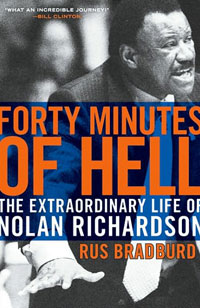The Dark Side

Had friend David Meggesey, author of the highly regarded Out of Their League (selected by Sports Illustrated in 2002 as one of the top 100 sports books ever written) and former NFL Players Association apparatchik not recommended Rus Bradburd’s Forty Minutes of Hell: The Extraordinary Life of Nolan Richardson (Harper Armistad), I very well might have consigned it to the pile of “Maybes” in my various stacks of “To Be Reads.”
While I am given to dismissing sports books as trite and one-dimensional (a bias that seems to linger), more and more, narratives about sports, sport figures, and singular sporting events seemingly are being better written and their subjects better chosen.
As is the case of former University of Arkansas and 1994 NCAA championship basketball coach Nolan Richardson’s story. Dave Zirin, who writes about sports for TheNation (which may be like writing about ice hockey for Vogue), intones in his blurb:
I’ve never read a sports book I would describe as operatic until now. Nolan Richardson’s story, both unique and universal, would challenge the most seasoned biographer, but Bradburd’s libretto is heartbreaking and inspiring. This is the finest sports biography I’ve read in years, hands down.
Biographer Bradburd has his own story to tell, having worked for pioneering round-ball coach Don Haskins at the University of Texas at El Paso (UTEP) when Haskins shattered a racial taboo by starting five black players and winning the 1966 NCAA basketball championship, trumping the dyed-in-the-wool racist University of Kentucky basketball mentor Adolph Rupp—a story told in the 2006 film Glory Road. Nolan Richardson had been Haskins’s first black player at UTEP.
Bradburd writes:
Richardson’s tenure at Arkansas ended after his explosive outburst at a 2002 press conference accusing the university of discriminating against him.
Former NBA All Star and big mouth Charles Barkely pays homage:
This is a great story about America and its hidden histories. Nolan Richardson understands the struggle because he did the heavy lifting. Every black college coach with a good job today owes Nolan Richardson a measure of respect for the fearless way he kicked down doors. Every American should thank him for showing us it was possible.
